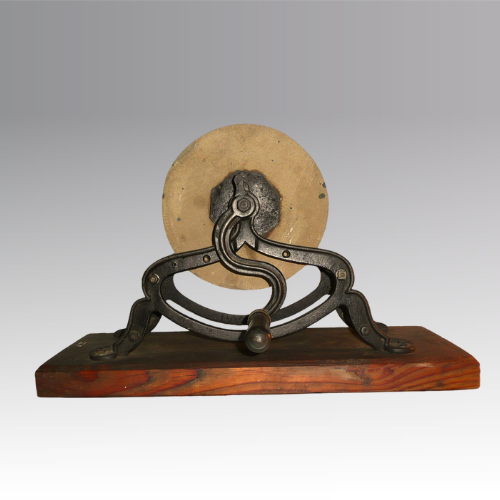
Grindstone belonging to Charles Chitty
-
Before the invention of stainless steel in 1915, metal knives were made of iron or carbon steel. They needed daily maintenance to prevent them from rusting, so these grinding machines were used regularly in Victorian households. This grindstone has no maker’s mark but is almost certainly an early example of one made by Spong & Co in London. The company was founded by James Osborn Spong in 1856 who patented over 100 labour-saving gadgets during his lifetime. The fluid lines of the cast metal and the S-shaped handle on this grindstone suggest that, as well as quality, design was a significant feature. This design is replicated in later, more sophisticated versions of Spong & Co’s knife cleaners and sharpeners.
Sharpening involved grinding the blade against the sandstone surface and later polishing it with a leather strop. Holding the knife at the correct angle while turning the wheel would have required a certain knack and effort.
Charles Chitty of Cambridge would have been adept at this art. He emigrated from the UK in 1863, serving in the Waikato War and in Taranaki. He returned to the Waikato in 1868, joining the Armed Constabulary in Cambridge overseeing the construction of roads and the defence of the Star Redoubt. Later, he and his wife Mary ran a flax mill near Leamington Cemetery and farmed a herd of cows. Their property ‘The Willows’ in Shakespeare Street on the banks of the river was renowned for its lovely gardens and views.
Charles and Mary’s daughter Eileen donated this grindstone to the Cambridge Museum.
- Accession No: CM131
- Maker: Spong & Co, London
- Where: Cambridge
- When: c1867
- Materials: Stone, metal, wood
- Measurements: 61 x 35 x 40cm
Ref: Wikipedia, 1stdibs.com, victoriancollections.net.au/items, Cambridge Museum records
